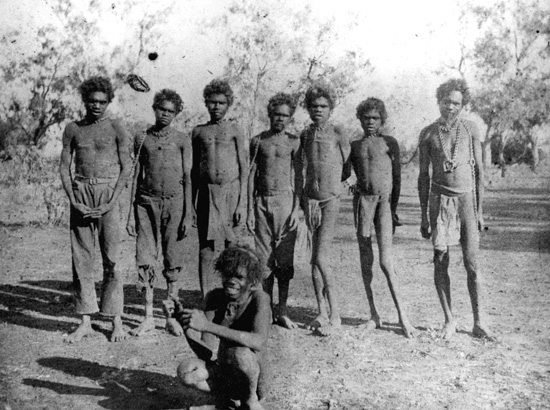|
Dispossession
When Western Australia was granted responsible government the British Colonial Secretary refused to hand over control of Aboriginal affairs because of the colony's poor
reputation in its treatment of Aborigines. Since colonisation had begun in 1829 some colonists and their descendants had murdered, mistreated and exploited Western Australia's Aboriginal communities for their own gain.
Towards the end of the nineteenth century laws were introduced in Western Australia to control the movements of Aboriginal people. These laws denied them the right
to work where they wished and enjoy the same conditions and entitlements as white people, the right to spend the money they earned as they saw fit, the right to raise their families in an Aboriginal
culture, the right to health care, the right to enter public places such as hotels, the right to live where they wanted and the right to own land. These laws applied to
northern Aboriginal people employed in the pastoral industry as well as the 'half-caste' population of the south, which was also systematically excluded from white society.
There was little for Aboriginal people to celebrate when Australia federated in 1901.
Deliberately excluded from participating in the new Commonwealth of Australia, they faced government and community racism. It was not until 1967 that a referendum
finally granted all indigenous people Australian citizenship and transferred responsibility for Aboriginal affairs from the States to the Commonwealth. Since then
conditions for Aboriginal people in the West have improved but remain significantly below those enjoyed by white Australians. There are still large differences in the state
of health, education, housing and employment between Aboriginal and non-Aboriginal peoples.
In the 1990s the Mabo and Wik High Court rulings found that common law recognised
the pre-existing rights of indigenous people. At the start of the twenty first century the question of native title is being resolved through litigation and negotiation involving
State, Commonwealth and private parties. Western Australia's Aboriginal communities survived the twentieth century in the face of discrimination and
indifference and are seeking redress for their dispossession. The story of settlement in the twentieth century cannot be told without acknowledging this fact.
|
|














